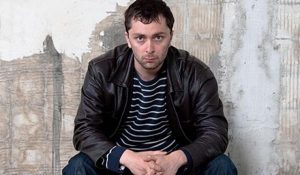Beyond Caring takes a stark and darkly humorous look at life on zero hour contracts, and how bubbling just under its down-to-Earth surface are worrying themes of insecurity and instability. To find out more, we spoke to writer/director Alexander Zeldin…

AZ: Well there are two pieces of legislation: the Agency Workers Directive of 2011 and Transfer of Undertakings from 2006. The first is an EU law that guarantees agency workers have some kind of rights in respect to other permanent employees. The other piece of legislation is really going to become increasingly relevant with the mass privatisation of our economy. When that starts happening more and more, and if those legislation are no longer in place, there is going to be no protection for people. Their employment will not be safeguarded. The people that voted for Leave, thought that it would remedy their situation and offer more rights and security for British workers, are unfortunately fundamentally mistaken because all evidence points towards the fact that the Government will be a pro-business Government and the lobbies in the business sector have been for a while arguing against this secure legislation for worker’s rights. So on balance, I’m not saying the EU’s perfect but in my opinion it’ll be will be a complete catastrophe for workers.
You’ve worked in places like Italy, Egypt and South Korea – Have you found that the issues of instability touched upon in Beyond Caring are specifically British?
AZ: Well the more important point about the current situation is what it reveals. I’m interested in insecurity as an emotional feeling and I think the concrete circumstance of insecurity, like zero hour work and so on, is actually revealing a broader feeling of insecurity in the country right now and a lack of clarity and sense of purpose which I feel is so eminent at the moment. That’s one of the reasons why I wanted to do the play and in the way I did it, because I felt that by focusing on a really particular situation I could talk about a bigger, almost spiritual picture.
How much real-life research did you do into zero hour contracts?
AZ: Well I did cleaning myself. I did some night shifts and we involved cleaners in the process from the start. What’s really been crucial in the three years the play has been going is that at every stage we’ve had very intense and really beautiful moments of contact with people who are in these contexts. We performed the play first in the basement of Unite, the British and Irish Trade Union, and that was a very strong experience. They’ve had real input in the play.
Did you feel a responsibility to do the issue justice after working alongside these people and seeing what they go through?
AZ: Well I think at the very heart of the piece is not the political dimension that’s important to me, but the conversation between human beings. There’s a certain human thing that happens when someone speaks to you very intimately and very personally about how they’re living. You have a personal bond and a responsibility to honor that rather than any kind of abstract issue.

AZ: I think about my work as writing on actors. That means I always ask the question, ‘what is it in this person that touches me and how could we build a character from an aspect of this person?’ The second thing that’s really crucial is that I think the theatre is a place where we have a really unique opportunity to look at life in a concentrated way. What I’m searching for in the theatre is a very intense experience of life and I think that comes from several things including the actual conditions that the space provides. A group of strangers watching another group of people allows us to really see ourselves and I think we are in desperate need of that in today’s environment. I think it’s a terrible crime to pass over these random events and fictionalise life. Life’s far too rich for it to be messed around with.
Did you take any influences from other works – theatre or any other medium?
AZ: Yes, I’m very interested in photography and I think there’s something extraordinary about early photographers such as August Sander who took photographs of people that were almost ethnographic. It was this really extraordinary moment at the beginning of the 20th century where people didn’t know what a camera was so they didn’t act up when they were being photographed, they were just being themselves. Sander manages to capture this extraordinary moment of truth and I think that the theatre is capable of doing that.
You’ve previously directed opera which seems worlds away from down-to-earth realism. Was there anything you took away from that experience that you brought to Beyond Caring?
AZ: Totally. I wanted to be working in the theatre but I had no idea about what a Theatre Director should be and one of the greatest accidents for me has been the discovery of trying to be close to myself and to trust myself and that’s what’s led me back to the kind of work that I make now. Beyond Caring is very much about time, and opera is measured out so precisely by the composer, it taught me a lot about musical structure, the shift of rhythm and light motif and the musical thinking that I still keep very much alive in my theatre work today.
Ideally, what lasting impression do you want to leave in the audience’s mind?
AZ: I just want people to be touched and I think there’s a very big different between true feeling and sentimentality. That’s very important. To actually be touched, human to human, is a very rich and I think sadly, a quite rare experience in today’s environment. If we can just get people to forget their mobile phones for a couple of hours that won’t be a bad result.
Beyond Caring runs from Wed 13 to Sat 16 July. Find out more and book tickets here.